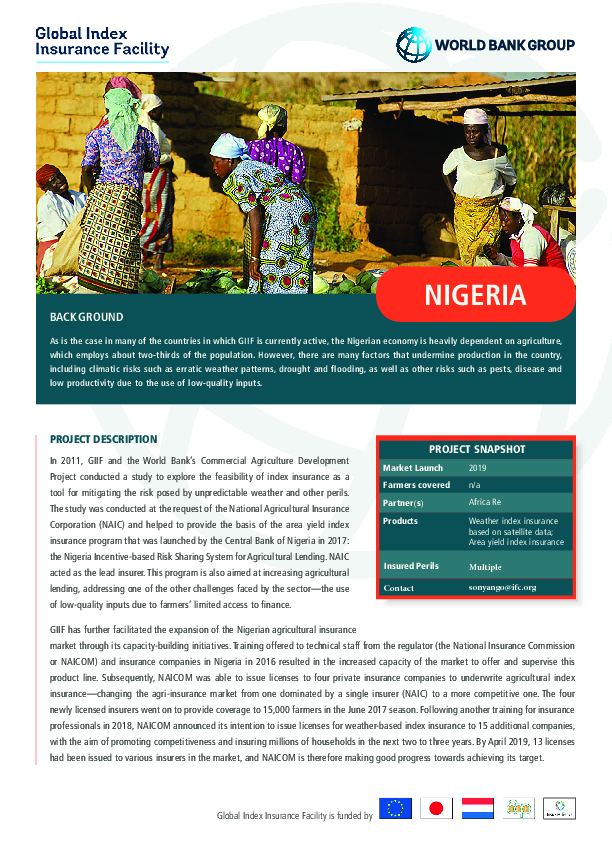The linkage between agriculture and climate change is undeniable. Any change in the climate has significant effects on crop yields and livestock, which intensifies the agriculture sector’s vulnerability to weather and disaster risks. More frequent extreme weather events and natural disasters distress the poor and the vulnerable most heavily and, as a result, agricultural and index-based insurance products have increasingly been regarded as significant tools for smallholder farmers to protect themselves from financial losses. As we know, insurance normally provides valuable access to credit and
Sub-Saharan Africa
Content owner:
The linkage between agriculture and climate change is undeniable. Any change in the climate has significant effects on crop yields and livestock, which intensifies the agriculture sector’s vulnerability to weather and disaster risks. More frequent extreme weather events and natural disasters distress the poor and the vulnerable most heavily and, as a result, agricultural and index-based insurance products have increasingly been regarded as significant tools for smallholder farmers to protect themselves from financial losses. As we know, insurance normally provides valuable access to credit and
The high transaction costs of serving low-income clients in developing and emerging market economies demand innovative and technological advancements. Challenges that inflate operational costs include data collection, processing and management, premium payment mechanisms as well as claims verification and settlement. Index insurance products, mobile payment devices or more accurate weather and agricultural-yield information based on satellite data are examples of innovative approaches that can help to overcome these challenges.
Content owner:
ACRI+
Date:
This roadmap is developed from work undertaken on ICRM through the “Promoting Integrated Mechanisms for Climate Risk Management and Transfer” project (“ICRM project”) implemented by the Deutsche Gesellschaft für International Zusammenarbeit (GIZ) GmbH and the Munich Climate Insurance Initiative (MCII). In Ghana, the ICRM project is working across three Workstreams within the agriculture sector: (1) sovereign drought risk insurance, (2) building capacities for risk prevention and risk reduction and (3) the development of insurance products for commercial agricultural actors.
The African Risk Capacity (ARC) is a continental sovereign risk pool and early response mechanism designed to execute pre‐approved contingency. ARC’s mission is to help African Union Member States to protect the food security of their vulnerable populations. As an insurance risk pool, ARC’s objective is to capitalize on the natural diversification of weather risk across Africa, allowing countries to manage their risk as a group in a financially efficient manner in order to respond to probable but uncertain risks.
The creation of a contingency plan is one of the prerequisites to participate in the African Risk Capacity (ARC) as this pre-planning process ensures that countries are able to deploy ARC funds quickly and efficiently in case of weather shocks.
The objective of the project is to provide the agriculture market in Ghana with more options to hedge against weather risks resulting from droughts and floods. This includes insurance solutions, sovereign risk transfer solutions (through ARC) as well as agricultural risk prevention and/or reduction measures. Additionally, a roadmap was developed to outline recommended next steps to up-scale and intensify the efforts toward an integrated climate risk management in the agricultural sector.
> On April 25, 2019, GIIF partner Atlantique Assurances Cote d’Ivoire (AACI) organized the official launch ceremony of its index insurance product – Atlantique Assur’ Coton – designed to provide insurance coverage for cotton farmers in Cote d’Ivoire. The ceremony was marked by the presence of several Government officials, including the Minister of Solidarity and Social Cohesion, Ms. Mariatou Kone (also Mayor of the town of Boundiali), the Prefect of the Bagoué Region, and the Regional Director of Agriculture. Hundreds of participants attended the event, including cotton
Published on:
Country:
> On April 30, 2019, the first Steering Committee meeting for the GIIF project in Cote d’Ivoire took place at Hotel Ibis Plateau, Abidjan. The meeting gathered 15 participants from the Government, insurance sector players and producer associations, to discuss about the setup of the Steering Committee as an enabling tool and guidance framework for achieving the project’s desired targets and outcomes. The meeting was chaired by Mr. Karim Diarassouba, the Insurance Commissioner, who also gave the opening speech. He emphasized the importance of agriculture and index-based

A newly designed Global Index Insurance Facility's Country Profile for Nigeria is available for digital viewing. The document contains an overview of GIIF's project in the country with Partner Africa Re.
